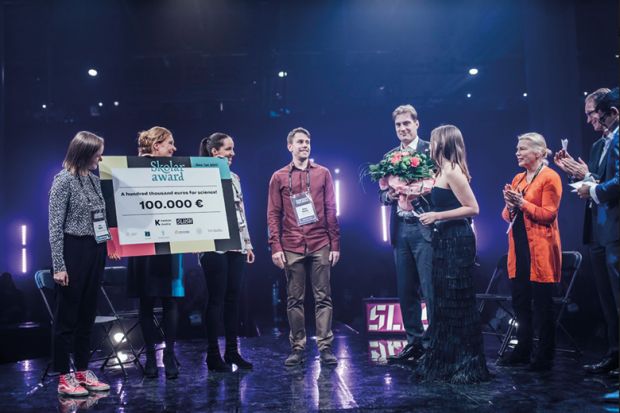At a time when budgets are under pressure, a competition in Finland offers an alternative approach to funding research proposals: a €100,000 (£88,000) prize, awarded after competing scholars gave three-minute pitches to entrepreneurs.
This year’s Skolar Award was presented on 1 December to Johan Seijsing, a researcher at the University of Stockholm, who won over the audience with his bid to use enzymes found in nature to treat bacterial infections.
Annina Huhtala, co-founder of KasKas Media, which runs the pitching event, said that it offered a new way for postdoctoral researchers to access research funding for original ideas at a time when traditional grant programmes are heavily oversubscribed.
“One of our aims is to narrow the gap between the start-up community and academia,” she said. “Most of the start-up entrepreneurs are quite young and they are also doing something crazy and wild.
“It is a good match to have these two groups where their brains are still flexible and they are full of enthusiasm.”
The awards, which are now in their third year and are part of Slush, Scandinavia’s biggest start-up event, came out of a project designed to boost researchers’ skills of communicating their research to lay audiences. Each of the finalists had hours of pitching and communication training prior to the event.
The prize money is provided by a group of six Finnish research foundations: the Walter Ahlström Foundation, the Runar Bäckström Foundation, the Paulo Foundation, the Foundation for Economic Education, the Helsingin Sanomat Foundation and the Tiina and Antti Herlin Foundation.
The prize money on offer through the competition has grown significantly following the first year when it was only €3,000.
Ms Huhtala said that the funders have been keen to get on board because they recognised the need for “more funding for wild ideas from young researchers”.
“Young postdocs and researchers have a really hard time acquiring funds for anything bold or anything new. If you work as a postdoc you basically have to work and persist and maybe perhaps after years you are able to pursue what you want to do,” she said.
Ms Huhtala added that Finland had made “pretty rough cuts” to education budgets in recent years, and that “the ones who suffer the most are the ones at the bottom of the hierarchy”.
The competition also attracted entrants from as far afield as Canada, the US and China.
Bert Van Landeghem, vice-chancellor’s fellow in economics at the University of Sheffield, said that it was a very good idea to encourage postdocs to explain their research in three minutes.
“In all types of funding application you have to summarise your research for a wider audience,” he said.




